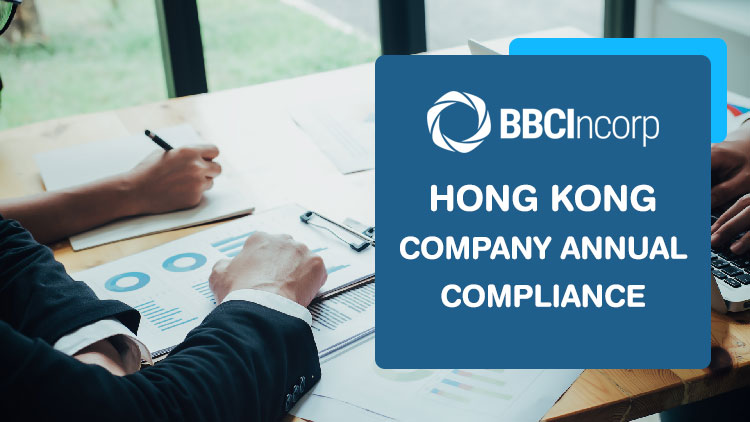Besides being the heart of Asian financial markets, Hong Kong is a wishful location for foreign investments due to its open-oriented business policies.
It is easy to incorporate, but to maintain the enterprise’s legal status, you should observe carefully the annual compliance requirements in Hong Kong.
Obliged by law, Hong Kong corporates must sustain the company management, and annual filing with the Companies Registry (CR) and the Inland Revenue Department (IRD).
Unless otherwise stated, compliance information showed in this post is for a private limited company, which accounts for over 95% of new company registration in Hong Kong each year.
1. Annual Compliance Requirements in Hong Kong
To ensure that a Hong Kong company stays legal and active, investors should pay attention to its annual compliance requirements.
The obligations comprise corporate management, yearly filing, and reporting.
Manage your business finances by working out all estimated cost for company setup, licenses, and so much more. 
COST PLANNING TOOL ![]() At-a-glance overview of business cost
At-a-glance overview of business cost ![]() Accessible and responsive consulting
Accessible and responsive consulting
1.1. Renewal of Company Secretary and Registered Office
Both local and foreign companies must appoint a Hong Kong resident as the company secretary. The secretary can be individual or body corporate.
To form a Hong Kong firm, a local registered address is mandatory, but P.O box is rejected. You’ll need to provide this address to the Companies Registry (CR) in order to receive notices from the Hong Kong authorities.
1.2. Accounting and Auditing
Unless being in dormant status, a firm in Hong Kong must maintain an appointed auditor.
Furthermore, the company is also liable for preparing and retaining accounting records and annual accounts in Hong Kong. One important note is that accounting and auditing procedures must align with Hong Kong accounting standards. And those accounts will be examined by a Hong Kong registered auditor annually.
tips
Hong Kong Accounting Service helps you to check how much you are going to pay and what you must prepare for related accounting and auditing duties corresponding to your company’s situation. Affordable pricing, transparency, and CPA certified experts are what BBCIncorp will offer you.
1.3. Renewal of Hong Kong Business Registration
After company registration in Hong Kong, you’ll get a certificate and legally can start your company.
The business registration in Hong Kong can be valid for one year or three years.
Companies should annually renew one month before the expired date (formation anniversary) to meet the compliance obligations of the CR.
1.4. Internal Records
As Hong Kong corporates, you should keep these records and documents:
- Certificate of Incorporation (CI)
- Certificate of Business Registration (BR)
- Articles of Association (AA)
- Records of resolutions, minutes of all meetings
- Updates of financial records (retained for seven years from the transaction date to avoid penalties)
- Company seal
- Share certificates
- Registers of members and directors
- Business licenses (if applicable).
All companies need to keep their statutory records at the company’s registered office or other places in Hong Kong as long as the company notifies CR.
Records of company’s former members, resolutions, and meetings need to be maintained for at least 10 years.
1.5. Annual General Meetings
Following the compliance requirements, a Hong Kong company must hold an Annual General Meeting (AGM) for the first time within 18 months from the formation date and every financial year.
The company should perform AGMs less than 15 months from the previous one and within 9 months after the company’s accounting reference period.
Moreover, Hong Kong registered auditors must audit Profit and Loss account and a balance sheet, then file those with the Inland Revenue Department (IRD). Simultaneously, a director’s report must be prepared as well. Report details will base on the checklist of the Companies Ordinance.
Importantly, it is the responsibility of the Hong Kong company to get directors’ approvals on such documents and present them to all shareholders of the company. The deadline for the presentation is within 21 days before AGM.
A Hong Kong company doesn’t need to hold AGM if it falls in one of the following cases:
- Single-member company
- Dormant company
- Everything required to be done in the meeting is done by a written resolution.
- A company can dispense with AGMs holding by a written resolution passed by all members.
Did you know how to determine your financial year end as a Hong Kong company? Here is a blog that could show you the way to do it!
1.6. Maintenance and Update of any Changes to the Companies Registry
According to Hong Kong compliance requirements, there must be at least one director who is a natural person, and one shareholder (a person or a body corporate).
Good news is that a local or foreigner is acceptable. But the person must be above 18 years old. It is possible for an individual to be the sole director and shareholder of a Hong Kong company.
In addition, it is compulsory to notify CR of changes in a Hong Kong company within 15 days from change.
Below are some changes that you’ll have to inform the relevant authority:
- Registered office address
- Secretary and director’s appointment or cessation
- Secretary and director particulars
- Company name (filing form NNC2 after passing the special resolution of the name change)
- The allotment or issuance of a new share (within one month
Note
Since 1 March 2018, certain Hong Kong companies have to maintain a significant controller register which must be available for inspection by law enforcement officers upon request. So, don’t forget to put this note in your consideration list before checking the next compliance duty.
1.7. Annual Return and Tax Filing
Companies are responsible for annual filing requirements in Hong Kong.
Firstly, a Hong Kong company must file annual return (form NAR1) with CR, which details the corporate particulars i.e., registered address, directors, shareholders, company secretary.
Secondly, the company must complete also the annual profit tax return with IRD.
The next part sheds light on how and when corporates should file these returns to avoid violating Hong Kong annual compliance obligations.
2. Annual Filing Requirements in Hong Kong
According to Hong Kong Companies Registry (CR) and Inland Revenue Department (IRD), either local or foreign corporates are accountable for annual filing requirements.
2.1. Annual Return with CR
HOW
- Filing an Annual Return (form NAR1) signed by a director, company secretary, manager or authorized representative.
- For company types other than private, certified true copies of the financial statements is mandatory together with form NAR1. The documents also have to contain the report of the auditors and the report of the directors.
- If there is no change from the last filed return, file a simplified version – form AR2 or AR3.
- Dormant corporates under the Companies Ordinance are exempted from filing annual returns.
- Online forms can be downloaded at www.cr.gov.hk
- Online submission is acceptable at www.eregistry.gov.hk
- Purchasing physical forms and submitting them directly at
Companies Registry
14th floor, Queensway Government Offices
66 Queensway, Hong Kong
WHEN
- Private companies have to file once every year, within 42 days from the anniversary date of foundation.
- Any late filings have to pay a substantially higher registration fee (from 870 HKD for private companies and from HKD 1,200 for the others, computed based on the date of the return delivered to CR).
- Moreover, companies failing to comply are liable to prosecution, if convicted, and default fines up to HKD 50,000 for each breach and HKD 1,000 daily fine.
2.2. Annual Tax Return with IRD
- Filing profits tax return (PTR) with its audited accounts.
Note
Audited accounts including:
- Company’s balance sheet;
- Auditor’s report;
- Profit and Loss account of the basis period;
- A tax computation illustrating how assessable profits or adjusted losses have been calculated.
- Forms of profits tax return (PTR) in Hong Kong:
Corporations (BIR51)
Persons other than Corporations (BIR52)
Non-resident Persons (BIR54)
- Online download forms at www.ird.gov.hk
- E-filing of annual tax return at www.gov.hk/tc/residents/taxes/etax/
- Directly issued forms and submission at
Inland Revenue Department
Revenue Tower, 5 Gloucester Road
Wan Chai, Hong Kong
WHEN
- Annual tax return is released by IRD on the 1st of April every year.
- For newly formed companies, PTR must be filed for maximum 18 months from the incorporation date, then every 12 months after the first tax return is made up.
- PTR must be submitted to IRD within 1 month from the issuance date.
- Failed to file tax return by the due date, filers may incur a penalty or prosecution.
2.3. Employer’s return with IRD
HOW
- Filing an Employer’s Return of Remuneration and Pensions (BIR56A) and related forms (IR56B/E/F/G/M) with IRD.
- Completing BIR56A despite not hiring any employee, not operating, or being ceased.
- An employer must keep payroll records of at least 7 years.
- Informing IRD about changes of employees’ particulars, terms of employment, and Hong Kong identity card number.
- After filing, a copy of the complete form should be provided to the employee.
- You can download online forms at www.ird.gov.hk
- Electronic filing is available at www.gov.hk/tc/residents/taxes/etax/
- Physical form release and submission at IRD.
WHEN
- IRD usually issues Employer’s Return on the first business day of April annually.
- As a first-time employer, complete and send Form IR6163 to notify IRD if you do not receive Form BIR56A by mid-April.
- The failure of submission is liable for heavy penalties and even conviction.
Below is a summary for filing due date and use of each form:





